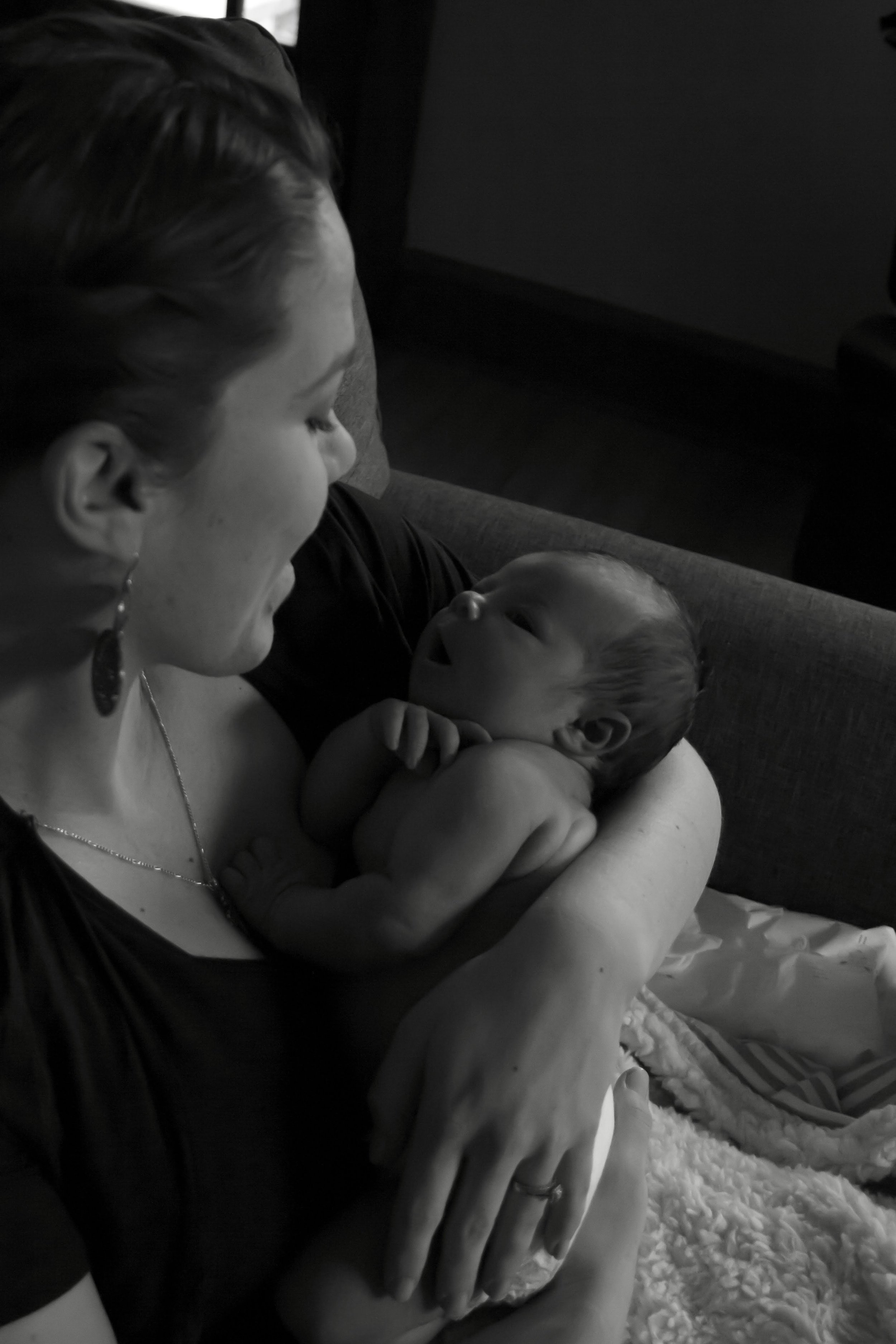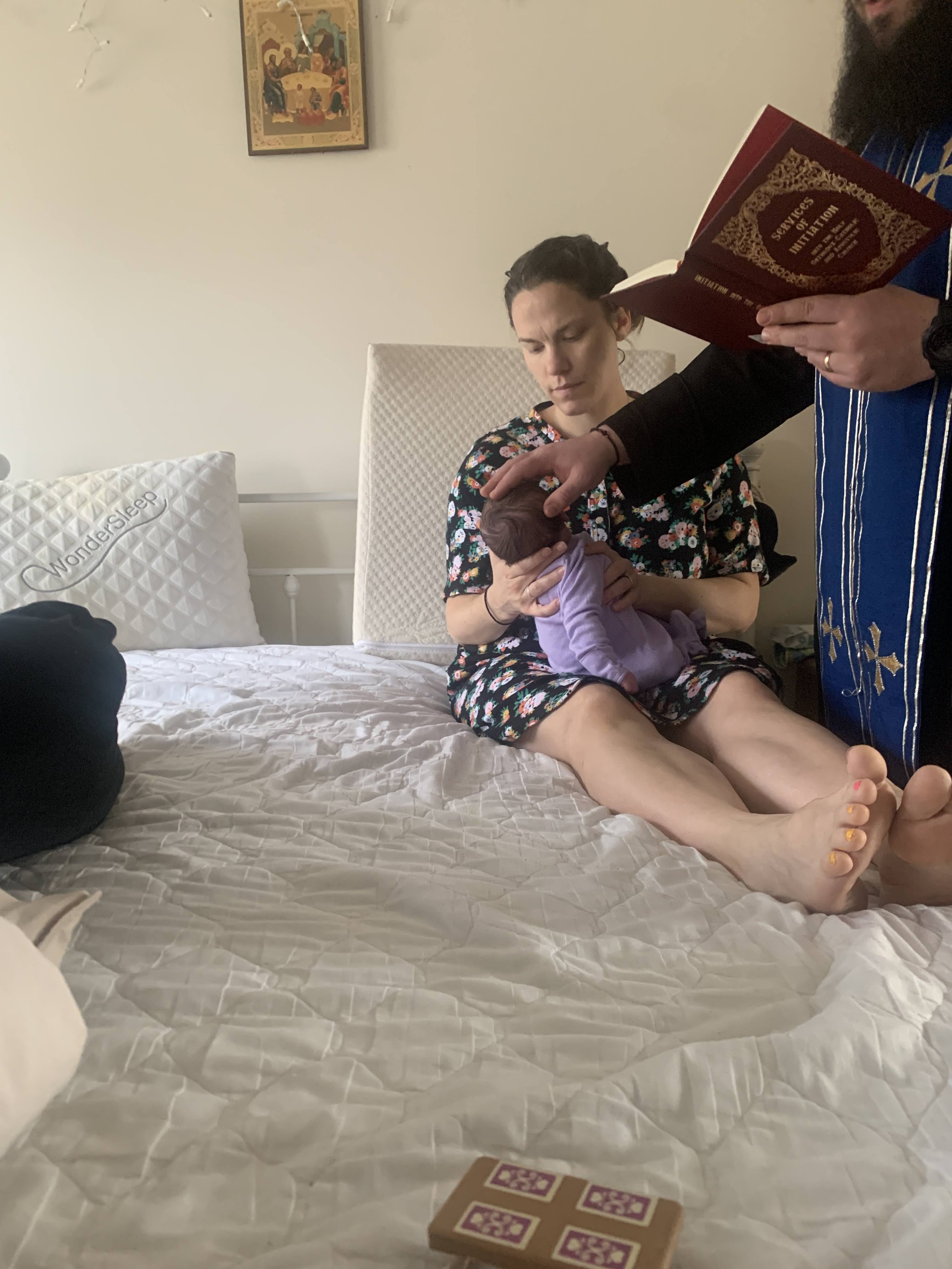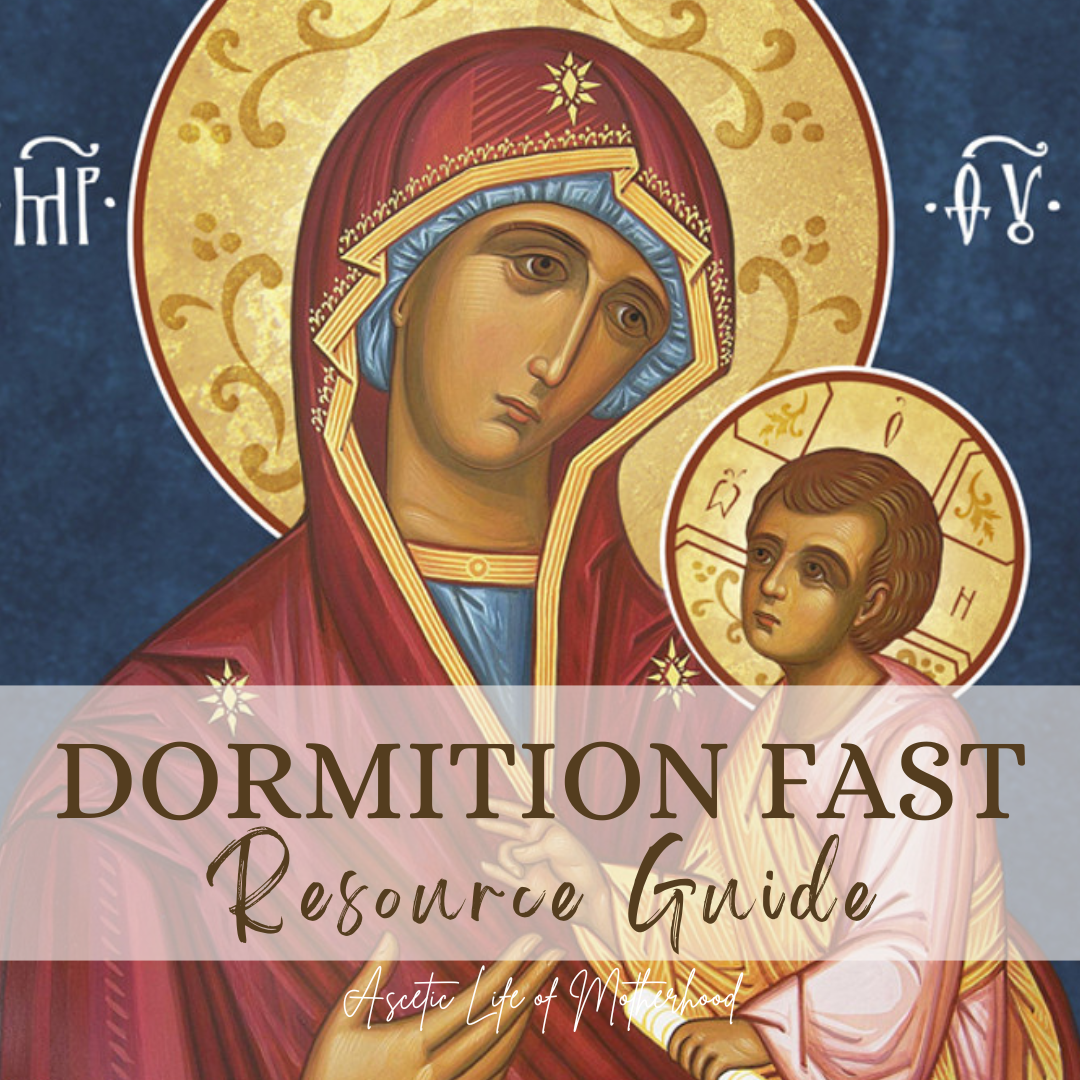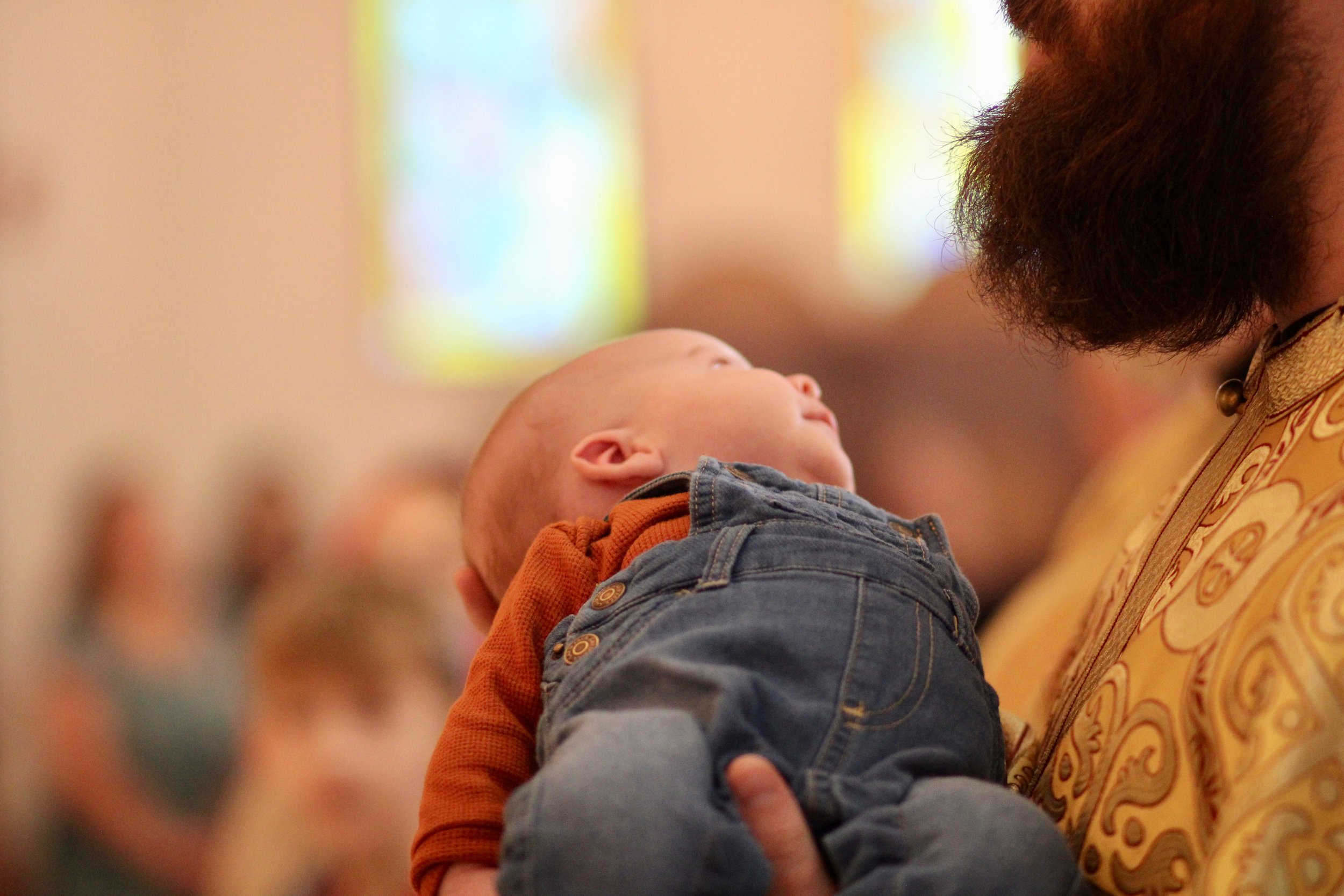Fasting as a Family
Guest Blogpost by Khouria Cathryn Barker of The Sanctified Womb
How Do the Nutritional Needs of Pregnancy and Postpartum Impact Fasting as a Family?
In the Orthodox Christian church, we spend approximately 180 - 200 days fasting in a year. The Church has given us fasting as a tool for salvation and acquiring the mindset of Christ. St. John of Kronstadt states, “They [fasting and prayer] cleanse us from sin, they lead us to spiritual peace, to union with God, to sonship, to boldness before God.” Fasting is not something to dread, on the contrary, it’s something to help our spiritual life and help us draw closer to God.
But, what about fasting as a family with young children, a pregnant or nursing mother, and a father who all may need to fast differently? These circumstances add an element to fasting that is unique to some seasons of life. What do the Church fathers say concerning fasting and family life? Why are pregnant and nursing mothers often given a less strict fasting rule?
I have experienced many different fasts in my life. I have been nursing, pregnant, or both for seven years. In the 27 years of being Orthodox, my fasting has seen very different seasons. Some were very strict and others more relaxed. But, I have always sought the guidance of my spiritual father and prayer before choosing a course for a particular fast.
I pray you find this article informative and encouraging and one that you can bring to your spiritual father if you find yourself wondering what your fasting rule should be for your season.
So grab your notepad, and let’s dive in!
Orthodox Christian Fasting Rules and Guidance From Church Fathers
Orthodox Christian fasting rules follow the traditions given to us by the Levitical law in the Old Testament as well as through the development of the liturgical life with the guidance of different councils and traditions over the last two thousand years.
Generally, it is prescribed to abstain from meat, dairy, eggs, fish, wine, and oil. Some traditions allow fish through the whole fast while others only allow them on specific days like Annunciation and Palm Sunday.
As much as the fast starts with food, it’s about so much more than simply substituting a garden burger for a beef patty or vegan cheese for mozzarella on your pizza. Fasting at its core, is an opportunity to decrease our passions. Many church fathers say that the mouth is the root of our passions and if we can tame our mouth and stomach– with fasting – we can tame our other passions.
So, if fasting is about more than just the food on our plate, it is understandable that the church does not look at fasting as a black-and-white issue but sees it more as a training tool. While some may be able to fast to the strictest standard and tame their passions, another person may only be able to abstain from meat and is still able to quiet his passions while receiving mercy.
In St. Paul’s epistle to the Romans, he states, “Let not him that eats despise him that eats not; and let not him who eats not judge him that eats: for God has received him.” Romans 14:3 This epistle is read on the Sunday of Forgiveness also known as Cheesefare Sunday, which always falls on the final Sunday before Great Lent begins. This is the basic guideline from the church – don’t look at someone else's fasting rule and judge them. Ultimately, each fasting rule is between the person, their spiritual father, and God.
The elderly, those with ailments, mothers who are pregnant or nursing, and very young children may be allowed to follow a different fasting rule. We should remember that Christ desires “mercy not sacrifice” Mt. 13.
The Antiochian Archdiocese states, “The Church has always provided dispensations from fasting regarding specific illnesses, the very young and old, pregnant women and nursing mothers. Yes, children are growing but can do some level of fasting. Where your family is at in the fasting discipline is what needs to be determined with your parish priest (or spiritual father).”
While the Church allows mercy or economia in special circumstances, there is also a push to do the best you can, to reap the reward of the prescription. This is essential.
St. Paisios states that the fasting mother who observes the full clean weak fast finds her strength from remembering that Christ fasted for forty days. He continues to say “Keep in mind that these people had great simplicity and humility, they were receptive to the Grace of God; they fast humbly and are nourished divinely” Family Life - Elder Paisios p. 196
So, although there are dispensations for fasting rules, one should always do a self-examination and discuss fasting with their spiritual father to come up with a fasting rule that takes your specific situation into account as well as pushes you to lean more on Christ than on your stomach.
I write all of this as a mother who is currently nursing a baby. I know that my specific nutritional needs differ from that of my husband. I have discussed my nutritional needs with my spiritual father and I have a different kind of fast to follow during this season of life.
But if you don’t know the demanding nutritional needs of pregnancy and nursing, you don’t know where to start the conversation with your spiritual father, keep on reading for a look at what pregnant and nursing requirements are.
Nutritional Needs for Pregnancy and Postpartum
During pregnancy, a woman’s body undergoes a tremendous change to grow a new human being. A mother takes in food and water, which fuels her child's growth and impacts the rest of his life.
The nutritional needs of a pregnant woman require an incredible amount of fat and protein to have an optimal pregnancy. Can a woman be pregnant on a vegan diet? Certainly, but it takes an exorbitant amount of more thoughtful planning to maintain a vegan diet and optimal nutritional intake. And when it comes to fasting, we are called to simplify our lives during fasting seasons not make it more complicated with substitutions and excessive grocery bills.
Lily Nichols, RDN, has produced one of the best guidelines for pregnant women and nutrition. She has debunked the standard guidelines that give very little nutrition to women during pregnancy and postpartum. She emphasizes that pregnant women require not just more calories, but more nutrient-dense food to support a healthy pregnancy and postpartum.
So, when it comes to fasting while pregnant or postpartum, it may require a different type of fasting. One that allows you to take in the nutrients you need while also encouraging you to stretch a bit to draw closer to God.
For example, at the time of writing, I am two months postpartum and still require more nutrient-dense food to support healing and milk production. Therefore, I am personally still eating meat but I season it with only salt and pepper. I simply add ground beef to the meal to make sure I have extra protein and more readily available nutrients that beef provides. Additionally, I do my best to abstain from desserts, even if they are technically vegan. I am very aware of my nutritional needs but I still can fast in some ways.
Specific Nutrients Pregnant and Nursing Mothers Require
In Nichols's book, Real Food For Pregnancy, she clarifies the specific nutrients pregnant mothers need and how each impacts the development of a baby. She discusses that protein is needed in much higher amounts because new cells are multiplying by the millions and the body needs the raw materials to effectively grow not only the baby but also the uterus, placenta, and mother’s body.
When women are pregnant, protein requirements increase through the pregnancy, with 100 grams of protein a day being the standard, by the third trimester. When a mother is unable to eat enough protein she may suffer from nausea, headaches, swelling, high blood pressure, and decreased fetal growth, just to name a few.
And though there is the argument that plant protein is widely available, it does not provide the same level of nutrition as animal protein sources. Nichols states, “... the following nutrients are challenging to obtain in a vegetarian diet: vitamin B12, choline, glycine, preformed vitamin A (retinol), vitamin K2, DHA, iron, and zinc. If you follow a strictly vegan diet, meaning you consume absolutely no animal products — no meat, poultry, fish, dairy, or eggs — some of these nutrients may be impossible to obtain from your diet.”
Therefore, it is understandable and advisable to discuss this information with your spiritual father and perhaps have a different fasting rule.
Where to Find Higher Concentrations of Necessary Nutrients
Here are some specific nutrients pregnant and nursing mothers require and where you can find them.
B12 - meat, fish, eggs, and dairy
Choline - eggs and liver
Glycine - collagen
Vitamin A - full-fat yogurt and eggs (offers different absorption than carrots and sweet potatoes)
Vit K2 - full-fat dairy, eggs, and liver, and certain fermented foods.
DHA - fish, seafood, and eggs
Iron - animal products
Zinc - animal products
When building a meal plan, incorporate these foods into a balanced diet. You don’t need to eat every single one, every single day to have the best benefit. Rather, it’s more about mindfulness and awareness that your body requires a different concentration of nutrients at this time vs. what your family may need.
How to Fast as a Family
Since fasting is given to us as a tool and not strict doctrine, it’s understandable that there is a spectrum of fasting. While some families may be able to stick to meals without meat, dairy, eggs, fish, and oil some families may need to only abstain from meat or the children get a bit of eggs for breakfast and cheese with dinner to meet nutritional needs.
But this adds an element to meal planning that can be tricky. Do two meals have to be prepared if some people are fasting and others are not? Can a nursing mother eat one meal without meat and dairy? Does the diet of the children hinder the fasting of the father?
I think the easiest way to create simple meals for family fasting is to do big batches at the beginning of the week wherein breakfast and lunch are the same and dinner has variation. Meals like loaded oatmeal, roasted veggies, or soups that can easily be added onto with nuts, seeds, cheese, or meat for those who need it are great. I also try to make big enough dinners to eat as a left-over for lunch.
I make sure I get eggs, cheese, or meat in my breakfast and lunch and then try to create just one simple dinner that I can easily add more to if needed. See below for a full list of meal ideas.
Ultimately, you don’t want your life to be more complicated with fasting. And you definitely don't want to be frustrated every time you make a meal. Part of fasting is eating what is put in front of you and eating it with a thankful heart. Keep it simple and nutritious.
21 Meal Ideas for Fasting as a Family
These meals can be made in batches big enough to eat a few days in a row. With some planning, it can simplify your life and allow you to get in the extra nutrients you may require while still observing some if not all of the fast.
Breakfast
Egg casserole with seasonal fruit
Loaded oatmeal with chia seeds, pumpkin seeds, nut butter, coconut milk, and maple syrup
Fruit smoothie with vegan protein powder, spinach, and coconut milk add collagen powder
Lunch
Sheet pan roasted veggies topped with tahini dressing and nutritional yeast add ground beef or grilled chicken
Lentil soup add cheese or a hard-boiled egg
Veggie sandwiches or wraps with hummus, tomato, avocado, kalamata olives, and red onion add cheese or nutritional yeast
Dinner
Chili add ground beef on the side
Shrimp stir fry
Garlic and honey salmon with zucchini fritters
Tostadas with beans, tomatoes, and avocados, add ground beef or cheese
Mango shrimp tacos
Hidden veggies pasta with protein noodles and ground beef on the side
Rice bowls with sesame tofu/chicken and broccoli
Creamy vegan tomato soup add grilled cheese sandwiches or nutritional yeast
Greek garbanzo bean salad with hummus and pita add grilled chicken
Vegan black bean enchiladas
Vegan Zuppa Toscana add sausage
Crispy black bean tacos with guacamole add cheese and ground beef
Cabbage steaks with tuna
Lemon garlic and shrimp pasta
Lemon and dill salmon with roasted potatoes and broccoli
As you can see, there are many nutritious meals that you can make for your family while you add ground beef, hard-boiled eggs, or a sprinkle of cheese if needed. There are even some meals that require no additions because they have sufficient nutrients.
Save a printable copy here:
Free Download for the Dormition Fast:
Fasting – a Tool for Salvation and Mercy from God
Ultimately, I pray that it’s abundantly clear that fasting is very individual but can be adapted for family life. Keep your meals simple and gently guide your family that this is a time of simplicity. If you can always have a fat and protein option available you will be more satisfied and you won’t feel the need to load up on too many carbohydrates.
And always remember that it is not about the food itself but about the remembrance of Christ and our need for Him over all else. I leave you with this quote from St. John Chrysostom.
“I speak not of such a fast as most persons keep, but of real fasting; not merely abstinence from meats, but from sins as well. For the nature of a fast is such that it does not suffice to deliver those who practice it unless it is done according to a suitable law. So that when we have gone through the labor of fasting we do not lose the crown of fasting, we must understand how and in what manner it is necessary to conduct the business since the Pharisee also fasted, but afterward went away empty and destitute of the fruit of fasting. The Publican did not fast, and yet he was accepted in preference to him who had fasted in order that you may learn that fasting is unprofitable unless all other duties accompany it.”
Good strength to you!
Written by Kh. Cathryn Barker of www.sanctifiedwomb.com (Guest Blogpost)
Meet the Author:
Kh. Cathryn is a priest wife in the Antiochian Archdiocese, mother to 4 beautiful children 6 years old and under, a registered nurse turned homemaker and writer, birth enthusiast, and local prenatal educator. Kh. Cathryn is the owner and writer of www.thesanctifiedwomb.com where she discusses topics about fertility, childbearing, and family life from an Orthodox Christian perspective. She desires to encourage women to see that their fertility and childbearing are gifts from God and can be life-changing experiences. She also educates and encourages women to be active participants in their healthcare journeys. Be sure to follow her on Instagram @thesanctifiedwomb

































